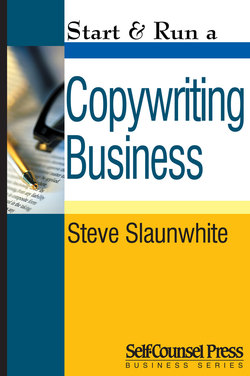Читать книгу Start & Run a Copywriting Business - Steve Slaunwhite - Страница 15
На сайте Литреса книга снята с продажи.
The Road to Success
ОглавлениеCopywriting is a surprisingly easy field to break into. Unlike writing a screenplay or a novel, you don’t need to get that one-in-a-thousand lucky break. Copywriting is a business, and if you apply yourself, learn a few strategies, and stick with it, there is no reason why you cannot generate a solid income with your own copywriting business.
Everyone can come up with reasons why they won’t be successful. For me it was age. I thought I was too old to switch from being a sales rep to becoming a self-employed copywriter. That was until I found out about David Ogilvy, perhaps the most famous copywriter of the 20th century. In advertising circles, he’s a legend — but he didn’t write a word of copy until he was 38 years old. Before that, he worked off and on as a salesperson, a diplomat, and even a farmer.
My road to becoming a self-employed copywriter was also not traditional. In university, I knew I loved to write. I also knew I enjoyed business. I just didn’t put the two together. So, when I graduated with a degree in business, I drifted, eventually finding my way to sales.
I liked selling. As a technical sales representative, I often toured manufacturing plants in a variety of industries and found it fascinating to learn about new products and how they were made.
I also enjoyed the independence of a sales career. Although I was employed, I often worked solo and unsupervised. Because my income was a mix of salary and commission, I had more control over how much I earned. It was a little like being self-employed.
Yet, despite these advantages, I began to feel increasingly unsatisfied. Even though I was a top performer for a number of years — in fact, for three years in a row I held the record for signing new accounts — I developed a nagging feeling that a sales career was not for me. Confused, I began to flounder.
Then it happened. One day, the company I was working for decided to redesign its sales brochures. I was pleased. Most of the brochures were poorly written, some even painful to read. I gave them out to customers only reluctantly. My fellow reps often said they used the brochures only to show pictures of the products. I thought, “Shouldn’t a sales brochure do more?”
Taking a breath, I marched into my sales manager’s office and offered to write the new brochures. I gave him a song and dance on the few writing credentials I had, and assured him the task would not interfere with my selling duties. Much to my surprise, he said, “Yes.” (In retrospect, he was probably not looking forward to writing the copy himself, and jumped at the chance of having the job lifted off his shoulders. Besides, my services were free.)
I don’t remember a time when I approached a task more enthusiastically. I worked late into every evening on the brochures; weekends too. I coordinated my work with our graphic design firm, even hanging around the studio during the photo shoot. I admit I loved it. Although I knew little about copywriting (I didn’t even know it was called copywriting) the brochures were received with unanimous applause around the company.
Then my carriage turned into a pumpkin, and I was back to life as a sales rep. But things had changed. Word of my writing skills spread through the company. First, the equipment division asked me to rewrite a proposal. Then the service manager enlisted my help on a particularly difficult customer letter. It didn’t happen as often as I would have liked, but whenever people in the company had something challenging to write, they turned to me.
It wasn’t long before I began learning everything I could about copywriting. I read every book I could find on the subject. Soon, I began to wonder if I could become a self-employed copywriter and work from a home office writing copy for clients.
Eventually, I began to build my copywriting business on a part-time basis — working many evenings and weekends to promote my services and complete copywriting assignments. The extra money I made went into a savings account to fund my eventual foray into full-time self-employment. This happy event occurred about three years later.
Over the years, I’ve built my reputation with a growing list of ad agency, design firm, and Fortune 500 corporate clients. I’m surprised at, and admittedly proud of, how fast I’ve managed to build my business to become among the top freelance copywriters in my market. If I can do it — starting with very little money, knowledge, or experience — with diligence and persistence, you can too.
